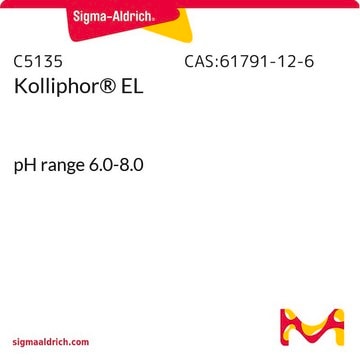50246
Poloxamer 407, micronized
Synonym(s):
Poly(ethylene glycol)-block-poly(propylene glycol)-block-poly(ethylene glycol), Lμtrol micro 127
About This Item
Recommended Products
mol wt
~9840-14600 g/mol
Quality Level
composition
oxyethylene content, 71.5-74.9%
impurities
≤0.25% ethylene glycol and diethylene glycol
≤0.4% total ash
≤0.75% water
≤1 ppm ethylene oxide
≤2 ppm arsenic
≤20 ppm heavy metals
50-125 ppm butylhydroxytoluene
ign. residue
≤0.30%
color
APHA: ≤120
particle size distribution
, coeff var ≤10% (residue, No. 140 USS)
, coeff var ≤50% (residue, No. 270 USS)
pH
5.0-7.5(1:10)
5.0-7.5(1:40)
suitability
complies for Infrared spectrum
InChI
1S/C3H6O.C2H4O/c1-3-2-4-3;1-2-3-1/h3H,2H2,1H3;1-2H2
InChI key
RVGRUAULSDPKGF-UHFFFAOYSA-N
Looking for similar products? Visit Product Comparison Guide
Related Categories
Application
Analysis Note
1,4-dioxane ≤5 ppm, ethylene glycol ≤620 ppm ( verified on random samples only)
Other Notes
Legal Information
Storage Class Code
11 - Combustible Solids
WGK
WGK 3
Flash Point(F)
Not applicable
Flash Point(C)
Not applicable
Certificates of Analysis (COA)
Search for Certificates of Analysis (COA) by entering the products Lot/Batch Number. Lot and Batch Numbers can be found on a product’s label following the words ‘Lot’ or ‘Batch’.
Already Own This Product?
Find documentation for the products that you have recently purchased in the Document Library.
Customers Also Viewed
Our team of scientists has experience in all areas of research including Life Science, Material Science, Chemical Synthesis, Chromatography, Analytical and many others.
Contact Technical Service






